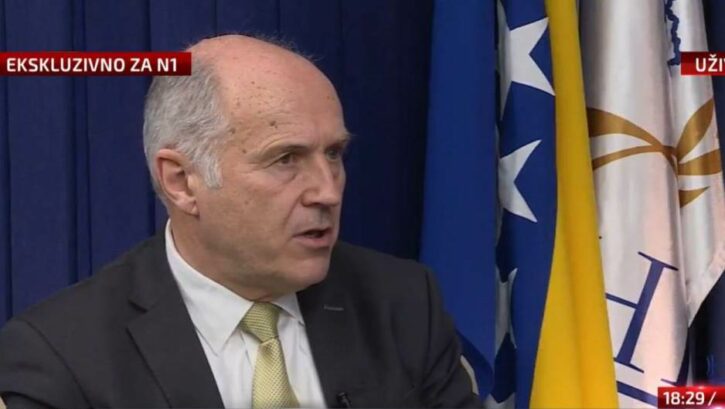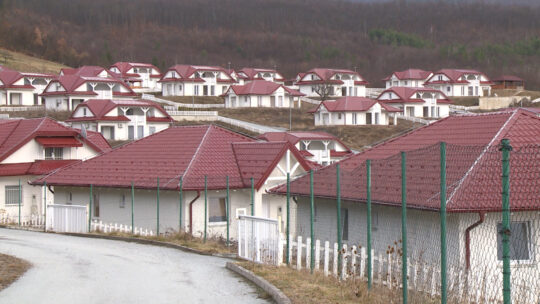
Although political and institutional leaders “showed an extraordinary level of preparedness to cooperate and coordinate” in light of the coronavirus pandemic, some political leaders have “resumed with their divisive rhetoric” as the situation appears to be relatively under control, Bosnia’s international administrator said in his 57th report on the situation in the country which he will present to the UN Security Council on Wednesday.
In his report, the High Representative – the international official overseeing the civilian implementation of the 1995 Dayton Peace Agreement which ended Bosnia’s war and includes the country’s constitution – pointed out a number of issues that have been plaguing Bosnia and Herzegovina for years.
The report covers the period between October 16, 2019, and April 15, 2020.
Inzko reminded of the fact that Bosnia and Herzegovina did not form a government for more than a year after the 2018 election and that the government in the Federation (FBiH), one of the two semi-autonomous Bosnian regions, has still not been formed.
Inzko strongly criticised the leadership of Republika Srpska (RS), the other, Serb-majority semi-autonomous region within the country.
“During the reporting period, the authorities of the Republika Srpska intensified their rhetoric and resorted to frequent actions targeting the sovereignty and territorial integrity of Bosnia and Herzegovina as well as the State-level competences and institutions,” he wrote.
He argued that RS authorities “persistently attempted to impose” an erroneous interpretation of the Dayton Peace Agreement, which refers to “Bosnia and Herzegovina as a union of states with limited and derived sovereignty that was created by two pre-existing entities as sovereignty bearers.”
“Such an interpretation not only represents revisionism of the General Framework Agreement for Peace, but also aims at providing the basis for the Serb people and/or the Republika Srpska to claim the right to self-determination,” he wrote.
He also criticised RS authorities for persistently demanding to revert to the so-called “original Dayton” – the way the country was set up immediately after the war ended.
“This rhetoric of “original Dayton” aims to deprive the State-level institutions of most of the competencies they have assumed in accordance with the State’s constitutional prerogatives, and to block any attempt to adopt State-level legislation in an area of State-level competence or to establish a State-level institution,” he wrote.
“The authorities of the Republika Srpska continued to undermine the State-level institutions, attempting to prove that they were inefficient, ineffective and not benefiting the interests of the Republika Srpska,” he wrote, adding that many state-level institutions, including the Parliamentary Assembly, were “paralysed” as their work was effectively blocked by the main Bosnian Serb party in the country, the Alliance of Independent Social Democrats (SNSD).
RS authorities “specifically targeted the High Representative and the Bosnia and Herzegovina Constitutional Court, as they are rightfully seen as guardians of the Constitution of Bosnia and Herzegovina,” he argued, adding that such actions were accompanied by corresponding rhetoric.
Inzko singled out SNSD leader and one of the three members of Bosnia’s tripartite Presidency, Milorad Dodik, as the “most vocal in challenging the sovereignty, territorial integrity, competences and institutions of Bosnia and Herzegovina.”
As for FBiH, the entity “continued to suffer from chronic dysfunctionality.”
“No steps were taken towards appointing a new Federation Government following the 2018 general elections,” he wrote, arguing that this is because of the continued insistence of the main Bosnian Croat party, Bosnia’s Croat Democratic Union (HDZ BiH), that this must be preceded by amending the country’s Election Law.
The FBiH parties have also made no progress on resolving the situation in the city of Mostar, where no local election took place since 2008, he wrote.
“Tackling corruption and dealing with organized crime remained a cause of deep-rooted public disappointment in the criminal justice system,” the Austrian diplomat stressed.
He mentioned that FBiH never implemented legislation from 2013 which would establish a special prosecutor and court department for fighting corruption and organized crime.
The flow of migrants who are using Bosnia as a transit country on their way to the EU has continued but “significantly slowed as a result of the COVID-19 pandemic,” Inzko wrote, adding that there are between 6,500 and 8,000 migrants in Bosnia at the moment.
“Providing access to temporary accommodation and food in accordance with humanitarian standards remain the main challenges facing the authorities of Bosnia and Herzegovina,” he declared.
Inzko pointed out that all migrants in the country remain accommodated only in the FBiH, as the authorities in the RS continue to refuse to accommodate any migrants on their territory.
“The trends observed are alarming and must be reversed,” he declared, arguing that “the interests of all levels of government are best served not by rolling back essential reforms, but by implementing forward-looking reforms that support and strengthen the security, stability and prosperity of Bosnia and Herzegovina, and that promote local ownership.”
Inzko also wrote that he refrained from using the ‘Bonn powers’, a set of powers that enable him to adopt or annul laws and fire officials, among other things.
“Despite frequent challenges to the core principles of the General Framework Agreement for Peace during the reporting period, I continued to refrain from using my executive powers, pursuant to the policy of the Steering Board of the Peace Implementation Council, which seeks to promote local ownership over international decision-making,” he wrote.
He explained that he still insists on “the full implementation of the five objectives and two conditions established by the Steering Board of the Peace Implementation Council in 2008 as essential steps towards the transition of the closure of the Office of the High Representative.”
He also argued that there was no substantial progress in achieving “the acceptable and sustainable resolution of the issues of State and defence property.”



